Queer Lives: Narrations of Work Abroad (June 11)

It’s ten minutes to midnight. I’m sitting on the couch, a yellow pillow behind my head and my feet propped on the centre table. The windows are closed and the curtains are drawn tightly, a sheer white cascading down the wall. I can hear the rain through the glass – tip-tap-tip-tap. Like a blues scale on trumpet. Applause through a crowd. A flock of birds.
I’m sitting on the couch, listening to the rain, and I’m thinking about metaphors. I was reading an article by Ocean Vuong the other day, in which he writes that a good metaphor should have two things: a sensory connector and a logical connector. Put otherwise, a metaphor must bring together the origin image and the transforming image both visually and meaningfully – having only one, without the other, risks seeming forced and artificial. The road curves like a cat’s tail, he writes, is weak: there is a weak visual transfer, and none of meaning – a cat’s tail does not strengthen or change the nature of the road. The hair on my father’s arms like blades of molasses, he then offers, quoting Sharon Olds. A clear sensory connection – the hair of a man’s arms similar to the dark sheets of molasses. Beyond that, though, a logical connection – the father is sharp and sweet, containing both softness and a hardening that comes with age. The metaphor detours to add power, not distraction.
Throughout the day, I have watched my surroundings, searching for the double-sided connector so artfully described by Vuong. Visual comparison is alone not difficult – Mumbai is a city of colour, and even the smallest movements feel exaggerated, drawn-out. The rows of autos shuffling through the streets are ants on slick floor. A visual connector: the hard shells and covered bodies of the autos immediately remind me of the dome-shell upon an ant’s body. Logical connector: the autos are persistent, drawn together in-line, running smoothly when all else halts. Perhaps not the most elegant metaphor, but one that works on both fronts (at least in my opinion!).
And now, I’m sitting on the couch, listening to the rain. Rain like a blues scale on trumpet. Applause through a crowd. A flock of birds.
Right now, the rain is fingertips down my spine. The slide of a droplet down the wall recalls the trace of a finger along bone, gentle and barely-there, unmissable. Both are ephemeral; there is an end to the rain, and an end to the path of your hand. The intimacy of the touch suggests a lover, or even a parent – someone close. Just so, the rain feels like home. It brings the city to life, all vibrant greens and running red paint. Just as quickly, it turns violent, and the nails scratch your skin, leave a scar like a water-stain.
Or perhaps I’m just overthinking the rain. I’m certainly wishing for rain, though, when I wake up Wednesday to blinding light and a thick, sweltering heat. It’s a blanket, heavy and impossible to shrug off from the moment I step out of my bedroom. I eat a slow breakfast, sweating under the running fan – I’m awake later than usual, and the warmth of the day has truly set in. Thankfully, there’s little hurry to the morning: normally, Wednesdays are a work today, but this week I’ve moved my schedule. Today is Revathi Auntie’s birthday, and we’re celebrating with a family lunch.
First, though, I have my own surprise. Both Revathi Auntie and Asok Uncle have insisted I not buy any gifts – a prospect completely unacceptable to me – so I’ve instead decided on something simpler: the classic birthday flowers and cake. Initially, I consider sneaking off early in the morning so it is a true surprise, but there’s one inescapable issue. Revathi Auntie and Asok Uncle both wake up ridiculously early, before the sun rises, and it would honestly be more suspicious if I too were up that early. When I wake up, I nervously consider how best to make my escape – but, as luck would have it, neither of them question me much. I simply claim I’m going out to find matcha, and they wave me off without a second glance. The florist and baker are just around the corner, so within fifteen minutes, I’ve picked up everything and returned home to a delighted, if slightly exasperated, Revathi Auntie. The flowers, bundles of pink and white, are quickly placed in vases; the cake put in the fridge for later tonight.
My arms gummy with sweat, I toss on a fresh shirt, but it’s only minutes before I’m heading outside again. This time, it’s with Asok Uncle; the two of us are heading to a local bookstore-slash-library. Despite the heat, though, I always enjoy these walks through town with him. Asok Uncle is genuinely a walking encyclopaedia of Mumbai – as we pass every drooping bungalow and peeling mural, he tells me its story. One is the old train station building, where vendors used to crowd each morning selling snacks and hot chai. The other was home to a famous chess player. That big building – grey flat stone and a tall wall – a movie star lives there.
It’s only twenty minutes to the bookstore, a tucked-away, nearly invisible establishment called Trilogy. Although completely impossible to spot from the outside, the store actually has two floors – one is a traditional bookshop, and the other functions as a lending library. As Asok Uncle walks upstairs to return his book, I pour over the shelves of Indian writers, skimming through titles that catch my fancy. Eventually, I decide on two: one, a continuation of the murder mystery series I’ve been reading, and two, a collection of short stories about the lives of South Indian women, which I’ve heard Revathi Auntie mention previously.
On the walk back, we take a new route, passing through the famed Joggers’ Park and heading down the seaside for several minutes. By the time we get home, I’m once again soaked through, and head off to the bathroom for another shower and new set of clothes. It’s barely noon, and I’ve already gone through three shirts – it's true Mumbai weather, jokes Asok Uncle, as I emerge yet again.
Although we’ve just come home, it is time to leave for lunch, and the three of us pile into the car, valiantly trying to up the air conditioning before our skin melts into the leather. The restaurant we’ve come to, Bawri, is an Indian restaurant – but it’s Indian food as I’ve never had before. Soft, tender kebabs with a cucumber-mint chutney, cool on the tongue. A vegetable biryani that – pardon me my cliche – completely melts in your mouth. A pork shank, covered in a spicy, rich gravy, that feels more like butter than it does meat. We’re joined by four of Revathi Auntie’s close friends, and together, we manage to finish most of the meal – the leftover biryani, to my delight, comes home with us.
By the time we come home, several hours later, I'm nearly tripping over my own feet in tiredness. By the time Revathi Auntie and Asok Uncle follow me through the door, I’m face-down on the couch, hands dangling onto the floor. From what I’m told, we all slept for a few hours – I honestly don’t remember. One moment, I was walking up the stairs, heels dragging, and the next, I woke up in the living room, watching the ceiling fans whir aimlessly overhead. It doesn’t really matter, though; any evening plans we may have made are soon foiled anyway by the tell-tale clouds circling overhead. Within an hour, it’s raining again – and so, we gather around the dining table, bottle of wine half-empty, and eat cake. The house is our steady ship, closed-in and anchored for the storm ahead.
The rain continues into the early hours of the morning. I, as usual, sit by the window and listen. It feels like fingertips down my spine. A flock of birds. Applause, thunderous, through a crowd.
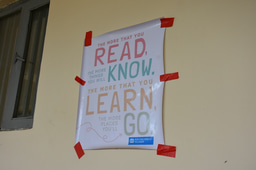
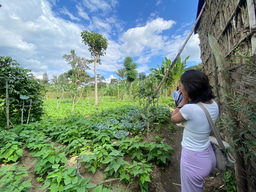
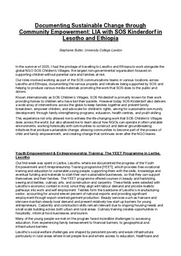
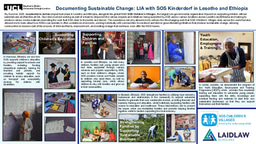
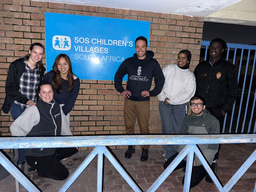
Please sign in
If you are a registered user on Laidlaw Scholars Network, please sign in